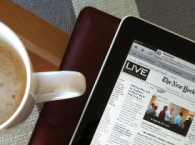For this Monday’s job search Q&A, I’m going to answer a question I got on Quora. It’s one I’ve personally given a lot of thought to over the years… as there is so much lying and BS-ing that goes on in the interview process these days.
The Question:
Should you be honest in a a job interview? I understand being brutally honest in an interview is not the best behavior. But is there any harm in letting them know about your failures in your past which serves as a motivation at present?
The quick answer:
Most recruiters, hiring managers, and people with good judgement will appreciate the fact that you: A. Don’t think your perfect, B. You acknowledge that you’ve made mistakes and C. You’re clearly willing to learn from them.
As long as your failure doesn’t seem like one that will reoccur on a regular basis or preclude you from doing the job you’re interviewing for, this is probably the type of answer that will gain you points versus working against you. I personally have always appreciated that candidness when hiring and felt pretty negatively about people pretending “working too hard” was a weakness or mistake.
Taking a deeper dive:
As for the broader question of being honest during job interviews, I am a big believer in honesty during the interview process, though I acknowledge that it’s not always going to be your fastest route to job search success. Beating the system by figuring out exactly what the interviewer wants to hear and then feeding it to them may get you a job faster… but will the job be the best fit given your natural personality, talents, strengths? For me, that’s the question.
Here’s what I’ve learned during my time on recruiting teams (and I know this isn’t always the case at all companies). The people interviewing you, particularly recruiters, are trained to ask questions that will predict future success, at the company and in that particular job. If they’re good at their job, they know the company, the job, the team dynamics, and all of the nuances way better than the person interviewing.
An example:
Let’s say I’m the recruiter and I ask you what type of manager you work well with. You tell me (because you’re being honest) that you work best with a manager who gives you a lot of autonomy and trust when carrying out your projects, but I know that the person you’d be reporting into is a crazy micromanager.
I might not move you forward in the interview process. It’s not because you’re not a great candidate, but rather because I don’t think you’d be happy and/or successful in the role given the team dynamics. Probably better to hire someone who responds well to a lot of structure/guidance.
So based on my insider knowledge, I’m making a good call that I can only make because you were honest. There are so many other examples like this where if you were to give the “safe” versus the honest answer, it could be a faster route to the job… but maybe not the right job.
[Tweet “When you’re not honest in an interview, you might get the job… but is it really the *right* job?”]
So, should you be honest in a job interview?
Well, if you are being very picky, I’d say take the approach of honesty and have the mentality that if the people on the other end don’t like you for who you truly are, it’s probably for the best.
If you really just need a job ASAP, you’re going to want to play it safe. Regardless of which camp you’re in it’s always a best practice to find out as much as you can about the company, the company values, the job, and the team ahead of time so you can use that info as a filter before answering questions in the interview process.
And of course, you shouldn’t take honesty so far that you shoot yourself in the foot. You don’t need to share the worst mistake you’ve ever made, a weakness that’s unforgivable etc. Be genuine, but realize that it’s still an interview and you should be putting your best foot forward. In my opinion, a healthy degree of authenticity is part of that.





